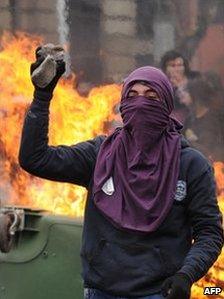Chile police break up student protest in Santiago
- Published

Students and teachers have been protesting for weeks
Riot police in the Chilean capital, Santiago, have used tear gas and water cannon to break up demonstrations by students demanding educational reform.
Dozens were detained as they tried to march to the city centre despite a warning that the protest was illegal.
Chile has seen weeks of rallies by students and teachers demanding reform and more investment in education.
President Sebastian Pinera has pledged extra funding, but student leaders say his offer is not enough.
Protesters are calling for the government to take control of the country's public education system, saying the current system is underfunded and unequal.
'Time has run out'
Riot police moved to clear the demonstrators as they tried to rally in Santiago's Plaza Italia in the city centre. At least 130 students were arrested, while two police officers were reportedly injured in the scuffles.
Earlier, some officers had clashed with activists who had set up street barricades using burning tyres.
Interior Minister Rodrigo Hinzpeter had warned that the protests were illegal and would be met with force.
"The time for marching has run out," he said on Thursday.
Camila Vallejo, a spokeswoman for the striking university students, called it a "state of siege".
"I imagine it must have been like this 30 years ago," she said, referring to Chile's 1973-90 military dictatorship.
"Even the right to congregate in public places isn't assured," she said.
On Monday, Mr Pinera presented a 21-point package of reforms and asked centre-left lawmakers to hold talks with him to end the dispute.
The proposal offered to increase funding, improve teacher training, increase university scholarships and help resolve unpaid student loan debts.
But opposition lawmakers declined the invitation and students said the offer failed to meet their demands.
Chile sets aside 4.4% of the country's GNP for education, less than the 7% recommended by Unesco.
- Published19 July 2011
- Published6 July 2011